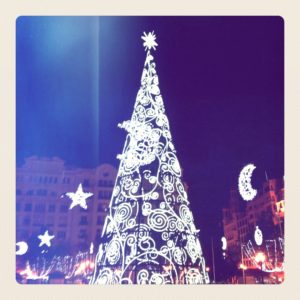 Hola a todos and welcome to another of Grace’s On Location Spanish updates. With November’s rain a thing of the past, as promised, my trusty umbrella has simply been gathering dust. Now, in the middle of December, the sun still shines brightly through clear blue skies but I can confirm that, with low temperatures of 17°C, I have joined the cult of the Continental Blood, sporting a coat and a scarf on my walk to university. How’s that for acclimatising?
Hola a todos and welcome to another of Grace’s On Location Spanish updates. With November’s rain a thing of the past, as promised, my trusty umbrella has simply been gathering dust. Now, in the middle of December, the sun still shines brightly through clear blue skies but I can confirm that, with low temperatures of 17°C, I have joined the cult of the Continental Blood, sporting a coat and a scarf on my walk to university. How’s that for acclimatising?
Now, I’m not sure if any of you have noticed, but a week from today…it’s Christmas! For that reason I had hoped to delight you with a rendition of my newly learned villancicos (“Christmas carols”), but I am sad to report that I haven’t yet had the opportunity to hear any. Sadder still, I was completely incensed to learn that, unlike in my Christmas-crazed hometown of Glasgow, Valencia’s decorations do not appear hot on the heels of Halloween celebrations. So where’s the Christmas cheer, Spain? Well, I must assure you that the festive spirit here is second to none, if kicked-off a tad late.
Right now in Valencia’s Plaza de Ayuntamiento (“the Town Hall Square”) you can visit the city’s Belén Monumental (“Nativity scene”) and the nearby Christmas markets are not to be missed. In busy almacenes (“department stores”), you wont find people frantically buying gifts, but instead, families preparing for the much-anticipated Nochebuena feast. Taking place on Christmas eve, this tradition is very much similar to the meals we typically enjoy on Christmas day. Much like other European countries, Spaniards are not known to give their gifts on the 25th, but Spanish children typically receive una pequeña Estrena which normally consists of a small amount of money. At the forefront of celebrations on the 6th of January are the children in Spain. Known as El Día de los Reyes Magos (in English “the Day of the Wise Men”), families receive their gifts and the festive season draws to a close.
Of course, at this time of the year, another important date is that of Nochevieja or New Year’s Eve. Cuando el reloj toca las doce (“when the clock strikes twelve”) instead of exchanging a kiss, Spaniards eat 12 grapes with the sound of every bell, as it is believed that whoever achieves this slightly bizarre feat will have good luck for the upcoming year. As a merely adoptive-Spaniard, I won’t be in Spain for the evening’s celebrations. However, in recent years university associations have been known to band together and host a dry run ahead of schedule in Salamanca, thus including the foreign students in el cotillón (“the New Year’s Party”). Prepare the spare bed, Iain! You’re getting a visitor from Valencia.
Although I hope you will have the good fortune of spending your Christmas at home with your families, hopefully you have found it interesting to learn about some Spanish customs too. Until my next On Location Spanish update, ¡Feliz Navidad, y Próspero Año Nuevo!

